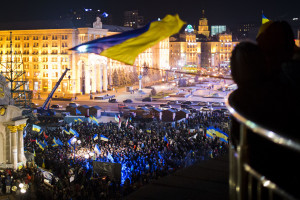
According to the UAE’s newspaper Al Watan, Euromaidan in Kiev resembles the turbulent protest movements that erupted three years ago in some Middle Eastern countries demanding a better life and destiny. But, over time, they went through a transformation, deviated from their original goals and eroded. Theft and plagiarism of slogans flourished in the political arena.
Some commentators point out that, in Ukraine, the people who took to the streets were driven by fair demands. But the opposition fell under the influence of alien forces from abroad which manipulated it following their own purposes that were far from the aspirations of the people of Ukraine.
In this approach in the media space to the developments in Ukraine, you would sense the influence of the heated debate going on in the analytical community of the Middle East as to the course and outcome of the Arab Spring.
The talk is, in particular, of the reasons for the continuing instability, the spread of violence and the obvious setback in the development of a number of countries in the region. For many Arab analysts, the issue of the external factor and its impact on the internal affairs of their countries is quite topical.
In this respect, the reaction of the Syrian newspaper As-Saura to the visit by US Assistant Secretary of StateVictoria Nuland to Kiev in the midst of the events is quite telling. The newspaper recalled US ambassador to Syria Robert Ford’s trip to the city of Hama in spring 2011 and his inciting address to the crowd – the fact that “was beyond any diplomatic norms”.
Many local political analysts see the developments in Kiev through the prism of changes in the geopolitical order in the world, the tough competition between models and systems of values, which spreads to an increasing number of different corners and regions of the planet.
It is noted that, after the collapse of the USSR, the West focused its actions on dominance in Eastern Europe and the expansion of NATO at the expense of former republics of the USSR. Russia has recently managed to neutralise the penetration of the NATO microbes into Ukraine.
Behind the shaking-up of Ukraine, there are forces which are trying to block the escalation of Russia’s activity in Eastern Europe and Middle East. Some analysts see the situation through the prism of the important strategic location of both Ukraine and Syria in their respective regions on the planet; hence they are at the centre of attention of geopoliticians and economists.
According to the Lebanese TV channel Al-Manar, after the USA failed to suppress Syria and gain control over the major corridor for oil and gas routes from the Gulf countries to the Mediterranean and then Europe, they switched to Ukraine as an important transit of energy flows from the RF to Europe.
In the opinion of some Arab analysts, the actions of the West in the Ukrainian crisis are motivated by its desire to get even with Russia for Syria, whose regime and statehood have survived in spite of the ongoing war, as well as for Moscow’s position regarding Iran and Egypt.
At the same time, there are materials which talk of certain imperial aspirations on the part of Russia and nostalgia for its past both in the Middle East and Europe.
The Lebanese newspaper An Nahar believes that it is inappropriate to attribute to Russian diplomacy a desire to turn the Middle East into the theatre of another cold war, although some critics do so: “The talk is of Russia’s demarches of a purely defensive nature to preserve Syria as a redoubt in the face of the policy of the West. In the view of the Russians, this policy is programmed to use the Arab spring for the moderate Islamic forces, which have now, in fact, become extremist, to enter the action arena at the first stage.” Moscow’s goal is to prevent this phenomenon from spreading into the territory of the Caucasus and Central Asia through its southern gates. The Lebanese newspaper points out that, as far as Ukraine is concerned, the RF – here as well – is not launching an expansion offensive to the West, but rather protecting the approaches to the space of its traditional influence.
Yuriy Zinin, senior researcher at the Moscow State Institute of International Relations (MGIMO), exclusively for the New Eastern Outlook online magazine.
